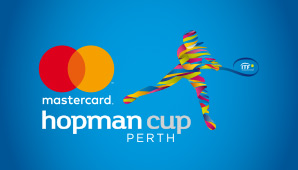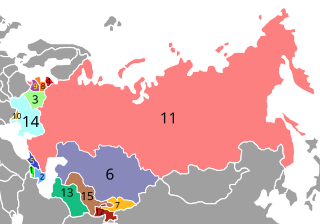
The Commonwealth of Independent States (CIS) is a regional intergovernmental organization in Eurasia. It was formed following the dissolution of the Soviet Union in 1991. It covers an area of 20,368,759 km2 (7,864,422 sq mi) and has an estimated population of 239,796,010. The CIS encourages cooperation in economic, political, and military affairs and has certain powers relating to the coordination of trade, finance, lawmaking, and security, including cross-border crime prevention.

Since the first human spaceflight by the Soviet Union, citizens of 47 countries have flown in space. For each nationality, the launch date of the first mission is listed. The list is based on the nationality of the person at the time of the launch. Only 7 of 48 countries have been represented by female "first flyers". Only three nations have launched their own crewed spacecraft, with the Soviets/Russians and the American programs providing rides to other nations' astronauts. Twenty-eight "first flights" occurred on Soviet or Russian flights while the United States carried eighteen.

The Hopman Cup is an international tennis tournament that plays mixed-gender teams on a country-by-country basis. It was first held in Perth, Western Australia each year from 1989 to 2019, played on indoor hardcourt, before being replaced on the calendar in 2020 by the now defunct ATP Cup. The tournament was played in an eight-team format, with the exception for the years 1990-1995, with twelve teams competing. It returned in July 2023 in Nice, France, played on outdoor clay, with six teams invited to participate.

The Uzbekistan national football team represents Uzbekistan in international football and is controlled by the Uzbekistan Football Association, the governing body for football in Uzbekistan.

The post-Soviet states, also referred to as the former Soviet Union (FSU) or the former Soviet republics, are the independent sovereign states that emerged/re-emerged from the dissolution of the Soviet Union in 1991. Prior to their independence, they existed as Union Republics, which were the top-level constituents of the Soviet Union. There are 15 post-Soviet states in total: Armenia, Azerbaijan, Belarus, Estonia, Georgia, Kazakhstan, Kyrgyzstan, Latvia, Lithuania, Moldova, Russia, Tajikistan, Turkmenistan, Ukraine, and Uzbekistan. Each of these countries succeeded their respective Union Republics: the Armenian SSR, the Azerbaijan SSR, the Byelorussian SSR, the Estonian SSR, the Georgian SSR, the Kazakh SSR, the Kirghiz SSR, the Latvian SSR, the Lithuanian SSR, the Moldavian SSR, the Russian SFSR, the Tajik SSR, the Turkmen SSR, the Ukrainian SSR, and the Uzbek SSR. In Russia, the term "near abroad" is sometimes used to refer to the post-Soviet states other than Russia.

The Commonwealth of Independent States Cup is a defunct annual regional association football tournament, recognized by FIFA.
The Soviet Union men's national tennis team competed in 1962–1991. The team competed with the name 'Commonwealth of Independent States' in 1992. Following 1992, the nations competed as:
The Belarus women's national tennis team represented Belarus in Billie Jean King Cup tennis competition and are governed by the Belarus Tennis Association. They compete in the World Group. After the 2022 Russia invasion of Ukraine, the International Tennis Federation suspended Russia and Belarus from Billie Jean King Cup competitions.
The USSR national rugby union team represented the Soviet Union in rugby union until the early 1990s.
The most successful teams in women's international rugby union have been England, France, and New Zealand.

Commonwealth of Independent States Free Trade Area (CISFTA) is a free-trade area among Russia, Ukraine, Belarus, Uzbekistan, Moldova, Armenia, Kyrgyzstan, Kazakhstan and Tajikistan. Five CISFTA participants, all except Ukraine, Uzbekistan, Moldova and Tajikistan, are members of the Eurasian Economic Union, comprising a single economic market, although Uzbekistan and Moldova are observers.

The Hopman Cup XXII corresponds to the 22nd edition of the Hopman Cup tournament between nations in men's and women's tennis. The tournament started on 2 January 2010 at the Burswood Dome in Perth, Western Australia.

The Eurasian Economic Union is an economic union of five post-Soviet states located in Eurasia. The EAEU has an integrated single market. As of 2023, it consists of 183 million people and a gross domestic product of over $2.4 trillion.
The 2012 Davis Cup was the 101st edition of the tournament between national teams in men's tennis. The Czech Republic won the championship, beating Spain in the final, 3–2.
Kazakhstan is a nation that has competed at two Hopman Cup tournaments and first competed in the 22nd Hopman Cup in 2010. Its best result to date is finishing second in their group in 2010.
The Commonwealth of Independent States is a regional organisation formed of former Soviet states that competed at the Hopman Cup in 1992. It reached the quarterfinal stage of the tournament.
Uzbekistan is a nation that has competed at the Hopman Cup tournament on one occasion, in 2003. In 2003, Uzbekistan won their qualification play-off but went on to place fourth in group A.
Ukraine is a nation that has competed at the Hopman Cup tournament on four occasions, the first being in 1993. In 1995 and 2016, Ukraine were the tournament runners-up and this remains their best showing to date. Before its dissolution, Ukraine used to form part of the Soviet Union which also competed at the Hopman Cup on two occasions in the early 1990s. Additionally, Ukraine is a member of the CIS which entered a CIS team into the 1992 event.
Russia is a nation that has competed at the Hopman Cup tournament on seven occasions, their first appearance coming at the 13th annual staging of the event in 2001. They have won the tournament on one occasion, in 2007, and were the runners up two years later in 2009.
A muftiate is an administrative territorial entity, mainly in the post-Soviet and Southeast European states, under the supervision of a mufti. In the post-Yugoslavia states, spiritual administrations similar to the muftiate are called riyasat.








